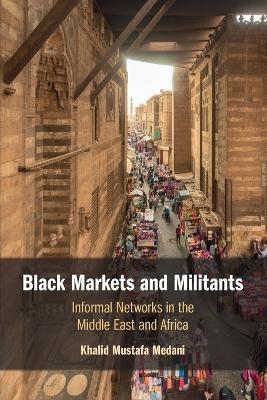
Black Markets and Militants
Cambridge University Press (Verlag)
978-1-009-25772-5 (ISBN)
Understanding the political and socio-economic factors which give rise to youth recruitment into militant organizations is central to grasping some of the most important issues that affect the contemporary Middle East and Africa. In this book, Khalid Mustafa Medani explains why youth are attracted to militant organizations, examining the specific role economic globalization plays in determining how and why militant activists emerge. Based on extensive fieldwork, Medani offers an in-depth analysis of the impact of globalization, neoliberal reforms and informal economic networks on the rise and evolution of moderate and militant Islamist movements. In an original contribution to the study of Islamist and ethnic politics, he shows the importance of understanding when and under what conditions religious rather than other forms of identity become politically salient. This title is also available as Open Access on Cambridge Core.
Khalid Mustafa Medani is Associate Professor in the Department of Political Science and the Institute of Islamic Studies at McGill University, where he is also Chair of the African Studies Program. He is the recipient of a Carnegie Scholar on Islam award between 2007–2009, and a Woodrow Wilson Scholarship in 2020–2021.
Part I. The Framework: Introduction; Black markets and militants: informal networks in the Middle East and Africa; Part II. The Institutional Context in an Era of Abundance: 1. The house the boom built: the informal economy and Islamist politics in Egypt; 2. Investing in Islamism: labor remittances, Islamic banking and the rise of political Islam in Sudan; 3. Islamist versus clan networks: labor remittances, Hawwala banking and the predatory state in Somalia; Part III. Globalization and Institutional Change in an Era of Scarcity: 4. Economic crisis, informal institutions, and the transformation of Islamist politics in Egypt; 5. From remittance economy to rentier state: the rise and fall of an Islamist authoritarian regime in Sudan; 6. State collapse, informal networks and the dilemma of state building in Somalia; 7. The political economy of radicalization: informal networks and the rise of an urban militant Islamism in Cairo; Conclusions. Informal markets and the politics of identity; failed states, the criminalization of informal networks and the global war on terrorism.
| Erscheinungsdatum | 14.09.2022 |
|---|---|
| Zusatzinfo | Worked examples or Exercises |
| Verlagsort | Cambridge |
| Sprache | englisch |
| Maße | 152 x 228 mm |
| Gewicht | 620 g |
| Themenwelt | Geisteswissenschaften ► Geschichte ► Regional- / Ländergeschichte |
| Geschichte ► Teilgebiete der Geschichte ► Kulturgeschichte | |
| Sozialwissenschaften ► Politik / Verwaltung ► Staat / Verwaltung | |
| ISBN-10 | 1-009-25772-2 / 1009257722 |
| ISBN-13 | 978-1-009-25772-5 / 9781009257725 |
| Zustand | Neuware |
| Haben Sie eine Frage zum Produkt? |
aus dem Bereich


